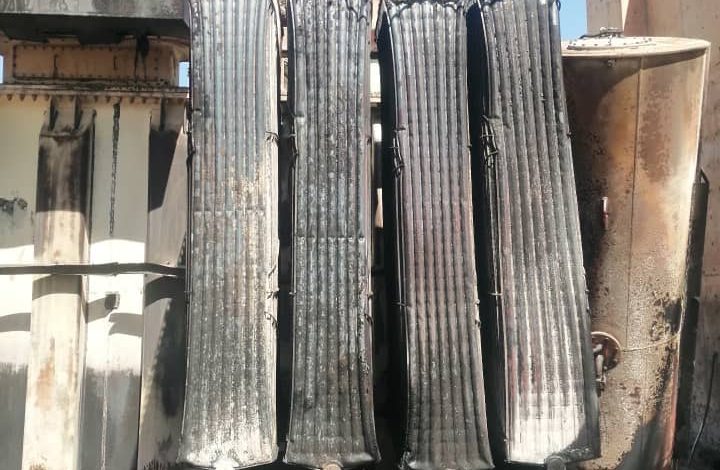Did the “Militia” Adopt a Scorched Earth Policy by Targeting Power Stations?

Sudan Events – Agencies
After 21 months of war in Sudan, a significant shift has emerged on the battlefield as the Rapid Support Forces (RSF) used suicide drones to bomb power stations, leading to widespread power outages in Khartoum and northern and eastern regions of the country.
Observers view the RSF’s actions as a new turn toward a scorched earth policy following recent military setbacks.
On January 13, RSF suicide drones attacked the Merowe Dam power station in the Northern State, which produces approximately 40% of the country’s electricity. The attack caused extensive power outages across several states.
On January 18, RSF drones also targeted the Shok power station in Al-Qadarif State, resulting in electricity cuts from the Upper Atbara Dams. This left Al-Qadarif, Kassala, and Sennar states in darkness.
Last Sunday, RSF drones struck the Dongola power station, the capital of the Northern State, cutting off power across the region.
Consequences of the Attacks
Although the attacks did not damage the dams themselves, they severely affected critical services such as hospitals, water stations, and marketplaces, exacerbating the humanitarian crisis. Moreover, the financial losses are immense, as each power transformer costs €2 million.
Khartoum was among the hardest-hit areas, suffering an 8-day power outage after RSF drones targeted the Marikhiyat power transformer. The bombing of the Merowe Dam also disrupted electricity transfer to the capital. Residents were forced to fetch water directly from the Nile as water stations halted operations, hospitals suspended procedures, and many bakeries shut down or raised prices due to reliance on private generators, according to a Khartoum state government official speaking to Al Jazeera Net.
In the Northern State, farmer Omar Satti expressed concern about the winter crops, which depend on electricity for irrigation, especially as the agricultural season nears its end. Many farmers have resorted to using diesel-powered generators to pump water from the Nile, significantly raising production costs.
An energy ministry official told Al Jazeera Net that Nile River, Red Sea, Northern, and Khartoum states were affected by the Merowe Dam attack last week. Electricity was partially restored through temporary repairs, with transformers relocated from one state to another since dam-specific transformers cannot simply be purchased but must be custom-made.
Heavy Losses
A government official, speaking on condition of anonymity, revealed that a single transformer costs €2 million. The official accused the RSF of aiming to disrupt life in cities and states where they lack control after failing to operate power stations in their territories.
Minister of Information and government spokesperson Khalid Al-Ayser condemned the RSF attacks on power stations and electricity lines as flagrant violations of international humanitarian law and the Geneva Conventions, which prohibit targeting vital infrastructure providing essential services to civilians, such as water and electricity stations.
In his statement, Al-Ayser stressed the need to hold the RSF and those supplying them with strategic drones accountable for these crimes.
Spreading Fear
Political analyst Faisal Abdel Karim said the RSF aims to boost the morale of its forces and vent their frustration by targeting power stations after losing Sennar and Al-Jazirah states over the past two months and failing in around 170 assaults on Al-Fashir.
In his remarks to Al Jazeera Net, Abdel Karim noted that the RSF seeks to create a sense of insecurity and fear in areas controlled by the army and increase pressure on residents. He argued that the destruction of service infrastructure punishes civilians rather than the government or the army.
The RSF’s deliberate attacks have significantly worsened Sudan’s humanitarian crisis, depriving millions of essential services and further intensifying their suffering amid the ongoing conflict, the analyst concluded.
Meanwhile, the Fikra Center for Studies and Development described the RSF’s targeting of power stations as unjustified and clear acts of terrorism in violation of international law.
A recent report by the center emphasized that the Geneva Conventions and their additional protocols prohibit attacks on civilian infrastructure essential for the survival of populations. These actions reflect the RSF’s blatant disregard for international standards and humanitarian principles.
Since the early weeks of the war, the RSF has been using suicide drones made from commercial components. In addition to these drones, the RSF possesses quadcopter drones also built with commercial parts, capable of dropping 120mm mortar shells.
The Sudanese army has downed several RSF drones and discovered boxes containing shells designed for these drones, according to photos and videos shared on social media.
Source: Al Jazeera Net



